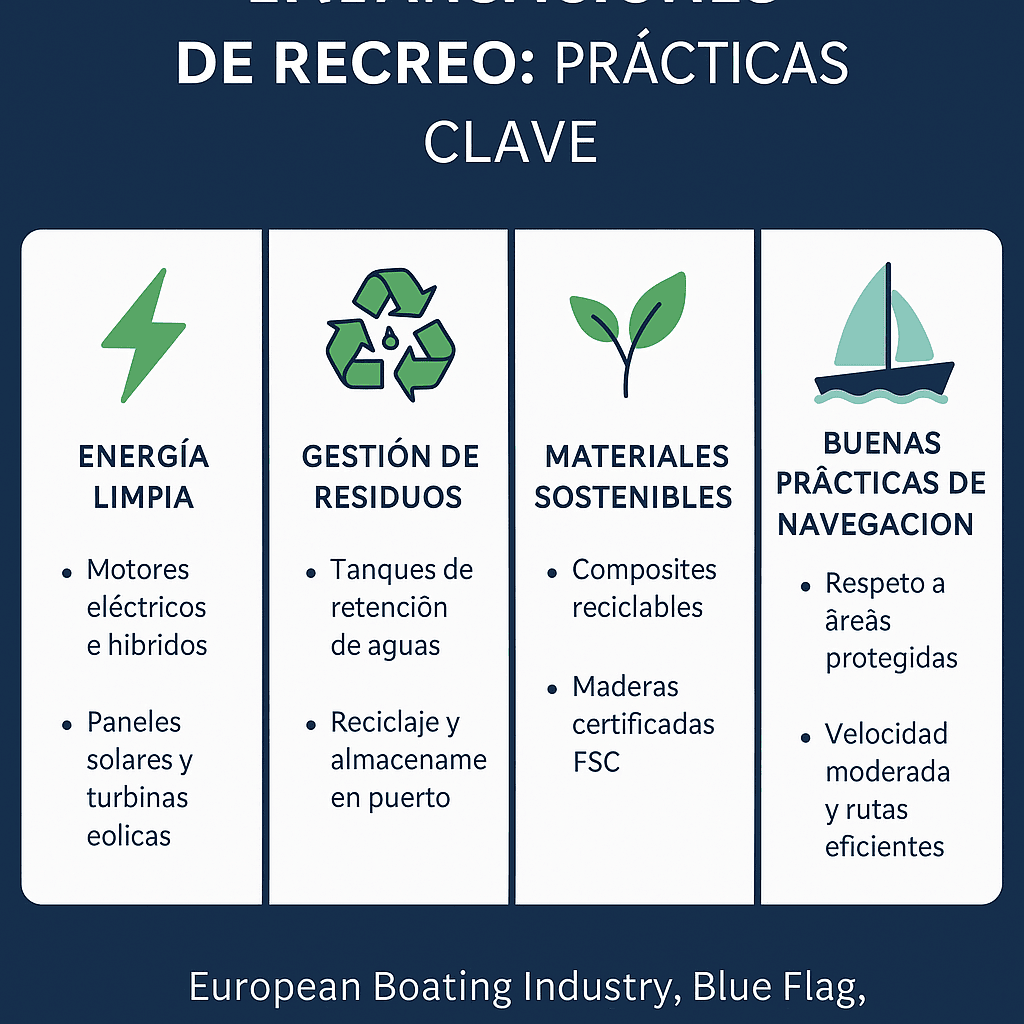
Sustainability in recreational boating is an increasingly important trend in the nautical sector. With growing pressure to reduce environmental footprints and increased regulations on emissions and waste management, owners and users of yachts, sailboats, and motorboats must adopt responsible practices.
From the use of alternative fuels to the proper management of wastewater and the choice of environmentally friendly materials, the path towards more sustainable shipping is full of opportunities and challenges.
In this article, we will explore best practices in sustainability in recreational boating, with real-life examples and solutions already in place in different parts of the world.
Somos provisionistas generales de buques
Descubre todos nuestros servicios de suministros navales y marítimos.
1. Reduction of energy consumption on board
Energy efficiency is a fundamental pillar of sustainability at sea.
a) Electric motors and hybrid propulsion
More and more shipyards are opting for alternative propulsion systems. One example is X Shore, known as the ‘Tesla of the sea’, with 100% electric, zero-emission vessels.
b) Speed optimisation and maintenance
Maintaining a moderate speed and cleaning the hull regularly can reduce fuel consumption by up to 20%, according to data from the European Boating Industry.
c) Renewable energy on board
The installation of solar panels and marine wind turbines allows batteries to be charged and reduces dependence on diesel generators, especially on long-distance sailing boats.
2. Responsible waste management
One of the main environmental problems in recreational boating is the poor management of solid and liquid waste.
a) Greywater and blackwater
The use of holding tanks and treatment systems prevents wastewater from being discharged directly into the sea. Many European countries already require this type of installation on recreational vessels.
b) Solid waste
It is recommended to separate and store waste until reaching port, avoiding dumping plastics or packaging into the sea. Programmes such as Blue Flag Marinas promote this type of good practice.
c) Environmentally friendly antifouling paints
Traditional paints contain harmful biocides. Instead, eco-friendly alternatives based on silicone or non-toxic materials are emerging that reduce environmental impact.
3. Use of materials for greater sustainability in recreational craft
The construction of recreational boats can also be more environmentally friendly:
- Recyclable composites: shipyards such as GreenBoats in Germany produce hulls using flax fibres and environmentally friendly resins.
- FSC-certified wood: used in decking and furniture to guarantee sustainable sourcing.
- Plastic reuse: innovative projects transform ocean plastics into boat components.
👉 Example: Beneteau Group is developing pilot programmes for recyclable composites for future ranges of sailing boats.
4. Good browsing practices
The behaviour of the sailor is key to sustainability:
a) Route planning
Planning efficient routes reduces fuel consumption and emissions. Digital tools enable the calculation of routes with less wind and air resistance.
b) Protected areas
It is essential to respect marine protected areas and anchor in authorised areas to avoid damaging Posidonia meadows and fragile ecosystems.
c) Environmental education
More and more yacht clubs and marinas are organising environmental awareness workshops for their members, promoting a culture of sustainability in the recreational sector.

5. Real-life examples of sustainability in recreational boats
- Norway: leading the transition to electric recreational boats in fjords and lakes where combustion engines are restricted.
- Spain (Balearic Islands): authorities promote the use of electric-powered rental boats to protect Posidonia seagrass beds.
- France (Côte d’Azur): marinas with charging infrastructure for electric boats are proliferating, in partnership with the Aqua SuperPower network (Aqua SuperPower).
6. Benefits of adopting sustainability in recreational boats
- Reduction in operating costs: lower fuel consumption and fewer repairs.
- Regulatory compliance: adapting to increasingly stringent laws on emissions and waste.
- Brand value: charter companies and shipyards gain prestige by offering sustainable options.
- Environmental protection: conservation of marine ecosystems vital for biodiversity and tourism.
Conclusions
Sustainability in recreational boating is not only an environmental obligation, but also an opportunity to innovate and offer more responsible experiences at sea. From the adoption of electric motors to respect for protected areas and the use of recyclable materials, every action counts towards reducing the impact of recreational boating.
Users and shipyards that adopt these practices will be at the forefront of an industry facing the challenge of navigating towards a greener and more efficient future.



